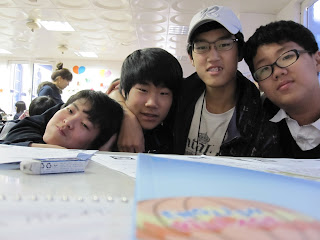 |
| Stonehenge entrance to the English Village in Paju |
But for those who can't afford the plane fare and the cost of tuition, there's a more affordable option closer to home: an English Village, where for a small admission fee, you can stroll along a cobble-stoned Main Street. And with a few stops at the bank, the post office, and a general store, you can practice your day-to-day English with a native speaker who might have a British accent.
 |
| Student going through immigration upon entering the English Village |
The first village opened in 2004; about a dozen have sprung up since around the country.
I visited the Gyeonggi English Village in Paju, one of the first programs to open and among the largest with more than 100 teachers from English-speaking countries and 50 staff members. The teachers all live in small apartments on site and they are encouraged to bring their spouses or get a dog, to make the village seem as lived-in as possible. The village also employs "edutainers" that write and produce plays and songs in English that also teach vocabulary and help students role play.
On weekends, people can come for a day or bring their kids. The village has also become a stop on the tourist circuit, so it's not uncommon for a big bus full of camera-toting Thai visitors to pull up next to the mock 'Stone Henge' that marks the village entrance.
During winter and summer vacations, the village offers low-cost, alternative study abroad programs for school children. During the semester, there are shorter week-long programs too.
The morning I visited last fall, a group of 330 students in school uniforms were checking in with their rolling suitcases. The first stop was immigration; they had to wait in line and produce their pretend passports and answer a series of questions from the blonde, foreign immigration officer.
Why are you coming to English Village?
 |
| City Hall at the English Village |
Are you ready to learn?
With a stamp of their passport they went on to their "hotels," or dormitories where they would sleep in bunk beds.
First class: Survival English The teachers taught them a range of questions that might come in handy. "Can you speak slowly please?," "How do you say this in English?," And "I feel sick, Can I go to the clinic?"
They also taught/reviewed with them the 5 W's Who What Where When Why and encouraged them to ask questions. "Have you married?" And "Where did you from?" were a few initial questions.
The rest of the curriculum included different types of classes, such as cooking and video production, where the goal is immersion.
It's extremely expensive to operate a village, and several have already closed or privatized. In Paju, half the shops and restaurants along Main Street appear empty. The director for English education initiatives with the Ministry of Education said he is not encouraging provincial government to build any new ones. But the Paju village is committed to its cause -- and has found ways to bring in new customers, such as business groups getting ready to go abroad or English teachers who want to improve their skills. It also rents out its facilities to rock bands or film crews looking to shoot on location - in a quaint Western town -- without leaving Korea.

Hi there, You can learn English in New Zealand also.Learn English in New Zealand and combine your language course with an amazing holiday! Thank you!.
ReplyDeleteHello, I just wanted to take a minute to tell you that you have a great site! Keep up the good work.
ReplyDeleteImprove English in South Africa
I could see that you had so much fun with your trip. Thanks for sharing this!
ReplyDeleteuniversity college london study abroad